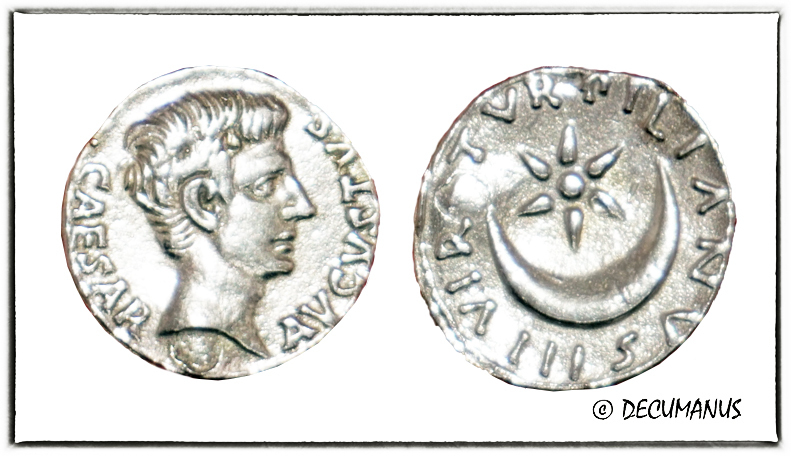Denarius Rating: 6,1/10 3732 votes
A Roman silver coin that weighed about 3.85 g (0.124 oz t) and hence would have a modern value of 74 cents. It bore a likeness of the head of Caesar and was “the head tax coin” exacted by the Romans from the Jews. Denarius (containing ten), Authorized Version 'penny,' (Matthew 18:28; 20:2,9,13) a Roman silver coin in the time of our Saviour and the Apostles, worth about 15 cents.It took its name from its being first equal to ten 'asses,' a number afterwards increased to sixteen. Denarius A Roman silver coin that weighed about 3.85 g (0.124 oz t) and bore an image of Caesar on one side. It was the daily wage of a laborer and was the “head tax”.
/ dɪˈnɛər i əs /
noun,pluralde·nar·i·i[dih-nair-ee-ahy]. /dɪˈnɛər iˌaɪ/.
a silver coin and monetary unit of ancient Rome, first issued in the latter part of the 3rd century b.c., that fluctuated in value and sometimes appeared as a bronze coin.
a gold coin of ancient Rome equal to 25 silver denarii; aureus.
QUIZZES
PREPARE FOR HIGH SCHOOL WITH THIS 9TH GRADE VOCAB QUIZ
Is your kid ready for high school? Let them take this teacher-created 9th grade practice test to see if their vocab makes the grade.
asset
Origin ofdenarius
Denarius In The Bible
First recorded in 1565–85; from Latin dēnārius, originally an adjective: “containing ten (asses)”; see origin at denary
Words nearby denarius
den, Denali, Denali National Park, Denali National Park and Preserve, denar, denarius, denary, denasalize, denationalize, denaturalize, denature
Dictionary.com UnabridgedBased on the Random House Unabridged Dictionary, © Random House, Inc. 2021

Example sentences from the Web for denarius
Shall I see aught with your eyes, lady of my Sergian denarius?
So he next drew out of a case several copper coins, together with a silver denarius.
When you write Diis manibus over me, every denarius will belong to you and the heirs of your body forever.
In this way he more than once sunk what was in truth a fortune without a denarius of profit in return.
The few small finds included Samian of the late first and early second centuries (but no '29'), and a denarius of Trajan.

British Dictionary definitions fordenarius
nounplural-narii (-ˈnɛərɪˌaɪ)
a silver coin of ancient Rome, often called a penny in translation
Word Origin for denarius
C16: from Latin: coin originally equal to ten asses, from dēnārius (adj) containing ten, from dēnī ten each, from decem ten
Collins English Dictionary - Complete & Unabridged 2012 Digital Edition © William Collins Sons & Co. Ltd. 1979, 1986 © HarperCollins Publishers 1998, 2000, 2003, 2005, 2006, 2007, 2009, 2012
Denarius To Usd
DENARIUS

Denarius Moore
A Roman silver coin that weighed about 3.85 g (0.124 oz t) and hence would have a modern value of 74 cents. It bore a likeness of the head of Caesar and was “the head tax coin” exacted by the Romans from the Jews. (Mt 22:19-21) In the days of Jesus’ earthly ministry, agricultural laborers commonly received a denarius for a 12-hour workday. (Mt 20:2) Hence, Revelation 6:6 depicts an extreme condition in stating that a quart of wheat or three quarts of barley would cost a denarius (a full day’s wage).
If the costly nard that Mary, Lazarus’ sister, used in greasing Jesus Christ had been sold for 300 denarii (nearly a year’s wages), likely this would have meant that a sizable amount of money would have gone into the money box kept by Judas Iscariot. Little wonder that dishonest Judas Iscariot raised strong objections, since he would be unable to embezzle even a fraction of this large sum.—Joh 12:3-6; 13:29; Mr 14:3-11.
The neighborly Samaritan of Jesus’ illustration spent two denarii (two days’ wages) to help an unknown stranger, and he declared himself willing to care for additional expenses in his behalf. (Lu 10:33-35) By contrast, in one of Jesus’ illustrations emphasizing the need of being forgiving, a slave whose debt of 60,000,000 denarii had been canceled was unwilling to pardon the 100-denarius debt of a fellow slave.—Mt 18:24-33.
[Picture on page 614]
How Much Is A Denarius Worth
Two sides of a Roman denarius